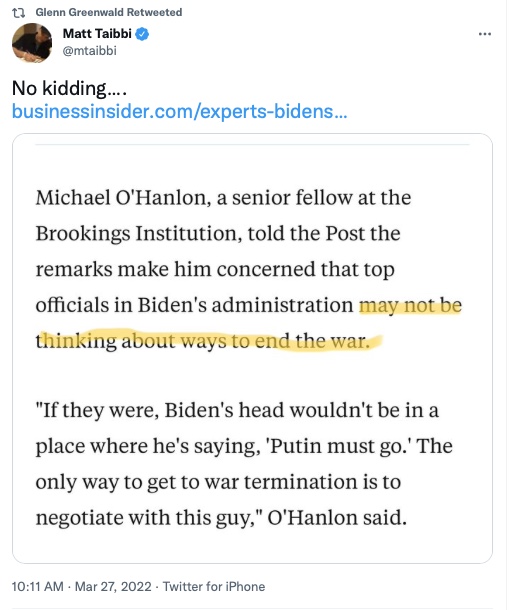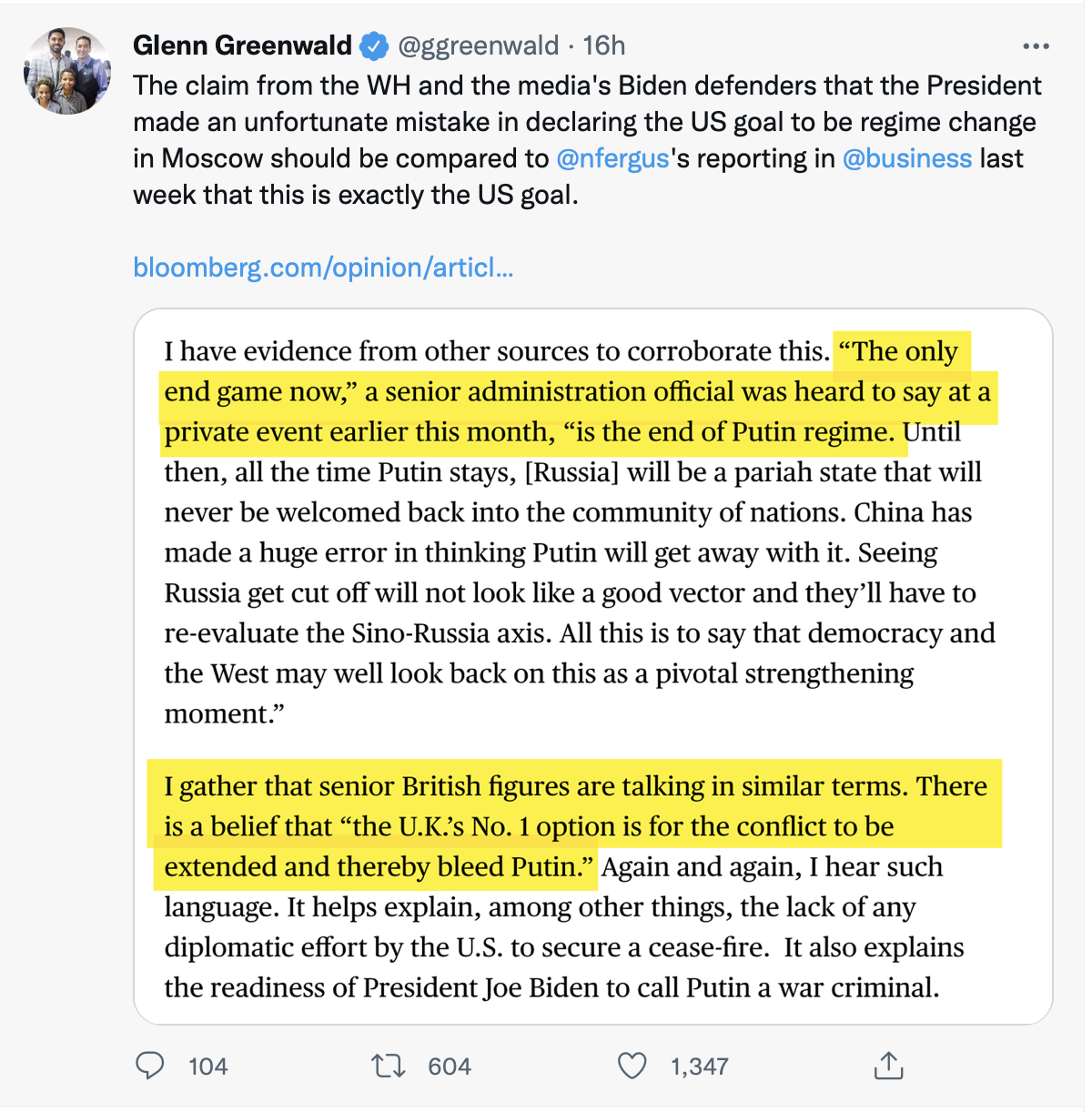Joe Biden’s reckless/incoherent rhetoric could get us all killed. I’m talking about his recent rhetoric. That’s on top of the fact that American news media has been pummeling us with non-stop unreflective pro-war messages leading up to the current sorry state of the world. We are where we are not because of a sober cost-benefit foreign policy analysis. This war has turned into theater or, perhaps, the existential version of the Superbowl, where U.S. officials refuse to open up a dialogue with Russia. That would be the thing that grown-ups would do when their conduct is nudging up the nuclear clock which, in 2018, was already at two minutes to midnight.
Here’s a “solution.” In case Joe Biden says something incoherent or reckless, the Washington Post headline writers are there to save the day. You see, Biden didn’t mean what he said, that thing that could result in a civilization-ending nuclear holocaust.
President Obama’s own arguments about a conflict between Russia and Ukraine — namely, that “Ukraine is a core Russian interest but not an American one” and therefore the U.S. should not risk confrontation with Moscow over it — were widely maligned as Kremlin assets if not agents. Others who urged the U.S. to try to avert war through diplomacy — by, for instance, formally vowing that NATO membership would not be offered to Ukraine and that Kyiv would remain neutral in the new Cold War pursued by the West with Moscow — faced the same set of accusations about their loyalty and patriotism.
Most taboo of all was any discussion of the heavy involvement of the U.S. in Ukraine beginning in 2014 up to the invasion: from micro-managing Ukrainian politics, to arming its military, to placing military advisers and intelligence officers on the ground to train its soldiers how to fight (something Biden announced he was considering last November) — all of which amounted to a form of de facto NATO expansion without the formal membership. And that leaves to the side the still-unanswered yet supremely repressed question of what Undersecretary of State Victoria Nuland referred to as the Ukrainians’ “biological research facilities” so dangerous and beyond current Russian bio-research capabilities that she gravely feared they would “fall into Russian hands.” . . .
As a result of the media’s embracing of moral righteousness in lieu of debating these crucial geopolitical questions, the U.S. government has consistently and aggressively escalated its participation in this war with barely any questioning let alone opposition.
The central question for Americans from the start of the war in Ukraine was what role, if any, should the U.S. government play in that war? A necessarily related question: if the U.S. is going to involve itself in this war, what objectives should drive that involvement?
Prior to the U.S.’s jumping directly into this war, those questions were never meaningfully considered. Instead, the emotions deliberately stoked by the relentless media attention to the horrors of this war — horrors which, contrary to the West’s media propaganda, are common to all wars, including its own — left little to no space for public discussion of those questions. The only acceptable modes of expression in U.S. discourse were to pronounce that the Russian invasion was unjustified, and, using parlance which the 2011 version of Chris Hayes correctly dismissed as adolescent, that Putin is a “bad guy.” Those denunciation rituals, no matter how cathartic and applause-inducing, supplied no useful information about what actions the U.S. should or should not take when it came to this increasingly dangerous conflict.
That was the purpose of so severely restricting discourse to those simple moral claims: to allow policymakers in Washington free rein to do whatever they wanted in the name of stopping Putin without being questioned. Indeed, as so often happens when war breaks out, anyone questioning U.S. political leaders instantly had their patriotism and loyalty impugned (unless one was complaining that the U.S. should become more involved in the conflict than it already was, a form of pro-war “dissent” that is always permissible in American discourse).
Matt Taibbi knows how to connect the dots:
And then there is this . . .





An internet friend wrote to me the other day that Biden may want the war to go on at least until the midterm elections. That was a Eureka moment for me. It’s probably the only way Democrats can retain power.
This is clearly a proxy war in which the U.S. has little regard to the Ukrainian lives that will be lost. If we cared, we’d be opening up a dialogue with Russia and exploring the possibility of stopping the bloodshed. But the U.S. is proudly refusing to talk with Russia.
Absolutely. Let Putin to have the Sudetenland.
I see … There are supposedly only two alternatives. One side wins or the other. I can already tell that you are not a professional mediator, because you would quickly go out of business.